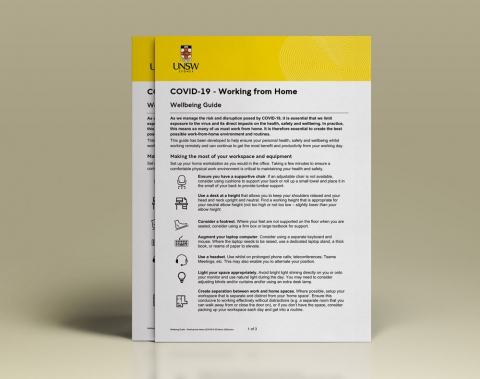The COVID-19 pandemic has impacted people on an international scale. After over a year and a half of this pandemic, it is natural to feel exhausted and burnt out.
We are committed to helping everyone in the UNSW community. For the latest advice from the university about all matters relating to the pandemic and our response as a university, visit the UNSW Covid-19 advice website. We have also made the ‘Working from home wellbeing guide’ available here.
For the most up-to-date advice from the Federal and state governments of Australia, go to the national Coronavirus website.
For student focused health and wellbeing information related to COVID-19 check out Mind and Body and COVID-19 Health info.
At UNSW, we characterise the factors that underpin wellbeing in four parts: mind, body, places, and culture. Our advice, links and resources are categorised accordingly.
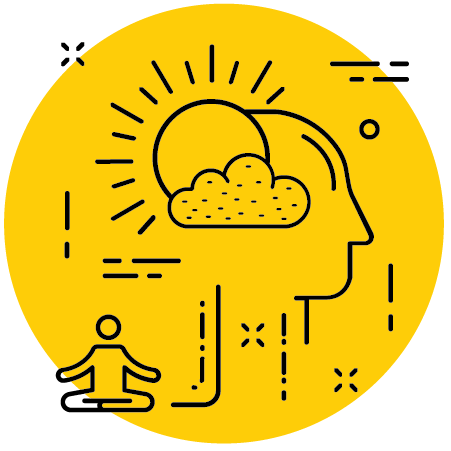
Mind
Anxiety
Experiencing anxiety about COVID-19 is a completely natural response. However, if your anxiety about the virus is starting to interfere with your day-to-day activities, you may need to seek help.
Benestar is UNSW’s Employee Assistance Program (EAP) provider and can be contacted on 1300 360 364. There is an online portal at www.benestar.com and an app for Android and iPhone users. These can all be accessed by all UNSW staff and their immediate family members. Login keys for the Benestar website and smart phone apps for UNSW staff and family members can be found here.
Avoid Information Overload
Although you want to keep up to date with current official advice about how to manage life under the COVID-19 crisis, it is important that you don’t become overwhelmed. Try to keep your news updates brief and confine them to a period of time in the morning and/or in the evening, rather than being plugged into updates and rolling news coverage all day.
Now that the daily Sydney 11am press conferences have ended, one option is to take an occasional look at The Guardian's Australian data tracker page. This page has graphs showing daily case numbers and trends, and also maps showing where cases are increasing and decreasing. If you want to find out the vaccination rate in your local area, you can find a map showing that information here.
Or, if you're feeling overwhelmed with updates, try taking a short or even long-term break from the news and social media.
Social connection
There is a lot of talk about ‘social distancing’, when what we really mean is physical distancing. It is more important than ever to maintain your social connections, with colleagues, friends and family.
Staff of UNSW are already familiar connecting with colleagues on Teams or Zoom. Do make time to check in on one another, especially regarding mental wellbeing. It is worth making time to phone and text your friends and family more than you normally would. Around the world, seriously ill COVID patients cannot be visited by their families due to the infection risk. Visitors are currently barred from all hospitals in NSW - not just for COVID patients - so please don’t wait until it’s too late to connect with loved ones!
Music and Reading
Reading a book or listening to music can take us into another world, leaving behind any worries or anxiety we may be experiencing in the moment. Sometimes it’s just the thing we need to create a mental break and allow us to refresh ourselves before getting back to our day.
Listening to music engages and lights up multiple areas of our brains. Playing music is even better for our brains, so if you’ve got an instrument gathering dust in a corner of your home, now’s your chance to dust it off. Check out this video from TED-Ed about the incredible benefits of music for your brain.
And check out this set of Music for Wellbeing playlists, curated by Greta Bradman, ABC Classic presenter, classical singer and registered psychologist.
Mindfulness
Have you always wanted to try mindfulness meditation but never really found the time to give it a proper go? Lockdown is a perfect opportunity to invest some time in this incredibly helpful practice. Mindfulness is the awareness that comes from paying attention to the present moment in a non-judgmental way. Practicing mindfulness can help you to relax and reduce your worrying and stress levels. It can improve your concentration and productivity and help you to be calmer and sleep better.
There are many apps available that will guide you in a practice of mindfulness meditation. Some require subscriptions and some are free, while others are substantially free with additional modules available for purchase or subscription.
For a free app, you can't go past Smiling Mind. This Australian app is used by over 6m people and has programs for both children and adults.
Headspace is another very popular app. It does require a subscription but you can try it out first with the free 10-day beginner's course.
A hugely popular free option is Insight Timer. Insight Timer has more than 100,000 free guided meditations. You can choose to donate to your favourite teachers if you find their work valuable. You can also easily see which meditations you've used recently so you don't have trouble finding them again in the vast library!
Resources
The Black Dog Institute is the only medical research institute in Australia to investigate mental health across the lifespan, aiming to create a mentally healthier world for everyone. They have a selection of free COVID-19 resources on their website. You can find resources for managers and workers, parents and young people and some great advice for people living alone during lockdown.
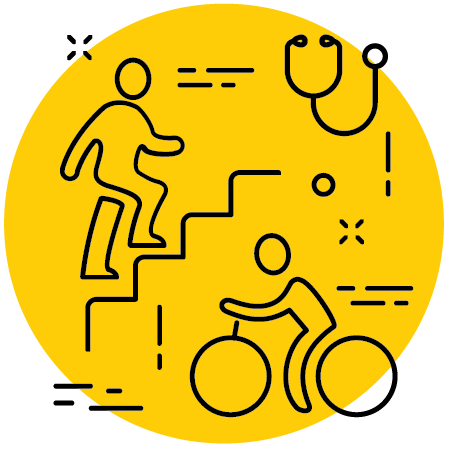
Body
Exercise
Exercising is so important for our physical and mental health. For many of us, the trip to work and back was the main source of activity in our workday. Considering that we may be in this homebound situation for several months, it is vital to get into a routine that incorporates exercise into our days.
This ABC article has some useful tips on how to exercise at home during the Coronavirus. Or try out this 7-minute workout. The Washington Post has a great set of 12 exercises you can do at your desk, with this animated and illustrated ‘work out at work’ guide.
If you are exercising with kids at home GoNoodle has some fantastic short videos you can all dance along to as a family (warning – you may have that tune about Fabio the Moose going around in your head for a loooong time!).
The Des Renford Leisure Centre offers free live online fitness classes during lockdown. The classes run Monday to Friday starting at 10am, then 11.30am and 12.30pm. Classes include programs such act HIIT, aerobics, yoga, pilates, strength and dance. Visit the Live tab of the DRLC Facebook page from 10am to access the live classes, or if those times don't suit you, watch the classes later on their Videos tab. A selection of pre-recorded video classes is also available on the DRLC website for those who don't use Facebook.
Yoga
Yoga is also a wonderful way to develop strength, balance, stimulate your body’s ‘operating system’ (including your lungs and circulation) and, of course, clear the mind. Try out these Yoga routines with Yogi Baron Baptiste, for 20, 45 or 60 minutes. Or explore Yoga with Adriene.
Nutrition
During Covid-19 isolation, we all need to keep ourselves healthy and well fed to boost our immune systems and support our mental health. Now that we are all homebound and can’t go out to restaurants, why not take the opportunity to try out dishes you’ve always wanted to make but never had the chance?
There are many resources online with a huge range of recipes available for you to try. Bon Appétit has an article on ‘Cooking at Home in the Time of Coronavirus’, Goodfood Australia has their ‘Non-panicky guide to cooking your way through quarantine’ and also a guide to what foods to keep on-hand entitled ‘Two weeks indoors? Ten things to plan for your pantry’ by ex-Masterchef winner, the entertaining Adam Liaw.
Ergonomics
Where possible, take the time to set up your home workstation as you would in the office. Taking a few minutes to ensure a comfortable physical work environment is critical to maintaining your health and safety. See the Covid19 Wellbeing guide for futher information
Sleep
Sleep belongs under both Mind and Body. In fact, without enough sleep, and enough quality sleep, all aspects of our lives begin to deteriorate. We are less productive at work, we are grumpy and irritable with those closest to us, and we make poor choices regarding exercise and nutrition.
Adults require between 7-9 hours sleep per night. If you are getting less than 5 hours of sleep, you have a 40% higher chance of developing obesity and an increased risk of developing Type 2 Diabetes. With only 4-5 hours sleep we are four times more likely to have an accident.
Don't be tempted to skip out on sleep so you can put in extra hours at work and "get more done". It won't make you more productive and it could be harmful to your health.
If you are struggling with sleep, you can try Insight Timer, which has several whole sections on sleep. There is Sleep Music, Sleep Meditations, Bedtime Tales and Sleep for Parents, as well as a range of Courses for Sleep which you can access with a subscription.
If meditation sleep aids are not working for you, it could be time to reach out to Benestar for assistance, or to your GP.
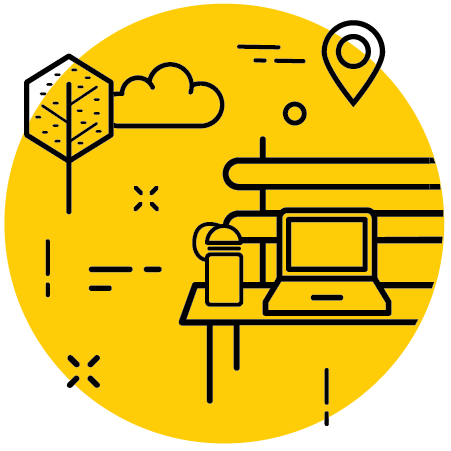
Places
Keep your home healthy
Now that we are all confined to our homes, it’s important to keep them clean. Here’s some advice from the ABC from 2020 on how to keep your home clean and free from the coronavirus. However, it is generally acknowledged now that most spread of COVID-19 is by aerosols. Even when lockdown is lifted, you may wish to continue wearing masks indoors and to request that any visitors you have (once we're allowed visitors) wear masks inside your home. Nick Scott from the Burnet Institute explains the importance of mask wearing in this short video.
Try virtual travel
Visiting a museum or historic site might be off the agenda for a while, but there are some you can visit online. The Washington Post compiled this list of 12 historic sites you can tour virtually.
If your kids are looking for an interesting distraction from home learning, Taronga Zoo is running regular Virtual Zoo Lockdown Lessons which allow you to connect virtually with the animals while guided by a qualified member of the Taronga teaching staff.
Gardening
Gardening has many benefits for wellbeing – getting outside in nature, the satisfaction of accomplishment, not to mention the joy of consuming your own home-grown produce. During the shutdown, gardening can be a great stress reliever and a way of providing some fresh produce so that you don’t have to leave home to go to the shops. This article from The Guardian has some great suggestions for growing a living pantry this coming winter – even if your only outside space is a balcony.
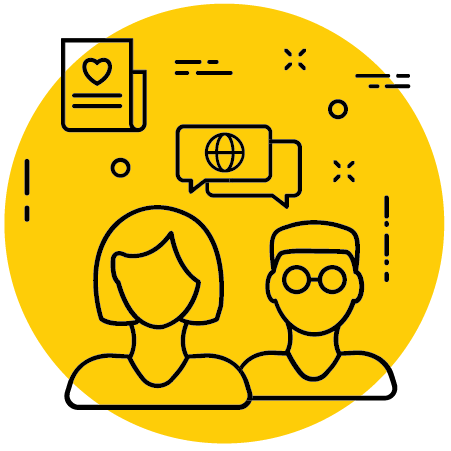
Culture
Be Kind
Be kind to yourself and to others. You can never know what others are dealing with, or why they might seem terse or abrupt with you, or not get back to you as soon as you’d like. Everyone’s work has been thrown into a spin by this health crisis. Many people in the community have already lost their jobs and are having an incredibly stressful time. Wherever you go, whomever you see or interact with (even online), practise giving everyone the benefit of the doubt and approach all your interactions with kindness.
Maintain a positive outlook and attitude
Focus on the good news stories and not just the bad. Despite all the bad news, there are also lots of good news stories out there. The crowd at Wimbledon recently gave a one-minute standing ovation to the developer of the AstraZeneca vaccine, NHS staff and other frontline workers. In NSW, people have been bringing chocolates, flowers and pizza to the staff at their busy local COVID-19 testing centres. Other people drop off cakes or leave money at nearby coffee shops so the testing centre staff can have free coffees. And some Sydneysiders have recreated famous artworks in their own homes for ABC Radio Sydney's Household Lockdown Portrait Competition. If you're looking for something to put a smile on your face, take a look!
Highlights of each day
At the end of the day, it helps to go over your day and think about the highlights. This can be a talking point for conversation at the dinner table with your family, or if you live alone, a topic to discuss in regular phone chats with a friend. It might seem some days like there were no highlights, but if you really think about it there is almost always something (even if it’s just something cute your dog did).
Gratitude
Practising gratitude has been shown to make people happier, more satisfied with their lives and less likely to burn out. Consider keeping your own gratitude journal, and remind yourself each day of all the things that you do already have that you can be grateful for, even in these uncertain times. Or try putting post-it notes on a wall so that others in your home can share what’s making you feel grateful.
Helping others
Times of crisis remind us that we are all in this together. If you have the time and capacity to reach out and offer help to someone else, it can be so rewarding. The person you reach out to benefits, the community benefits, and you may also enjoy the ‘return’ on altruistic behaviours.
On a local level, perhaps you can still visit the shops for essentials, but you know someone who can’t. Do you have a friend who is self-isolating, or an elderly neighbour or family member who is in a high-risk group? Perhaps you can help them set up an online shopping account. There are services like LogMeIn that can help you log into another person’s computer or tablet (with their full permission, of course).
If you do cook for neighbours, friends or family members, do remember to wash your hands and take all appropriate safety precautions when preparing items. Leave them at their front door to take in once you have left. Provide food items in containers you don’t need returned in the near future.
And remember, although you can’t visit these people right now, you can phone or text them regularly and ensure that physical distancing doesn’t become social distancing.


